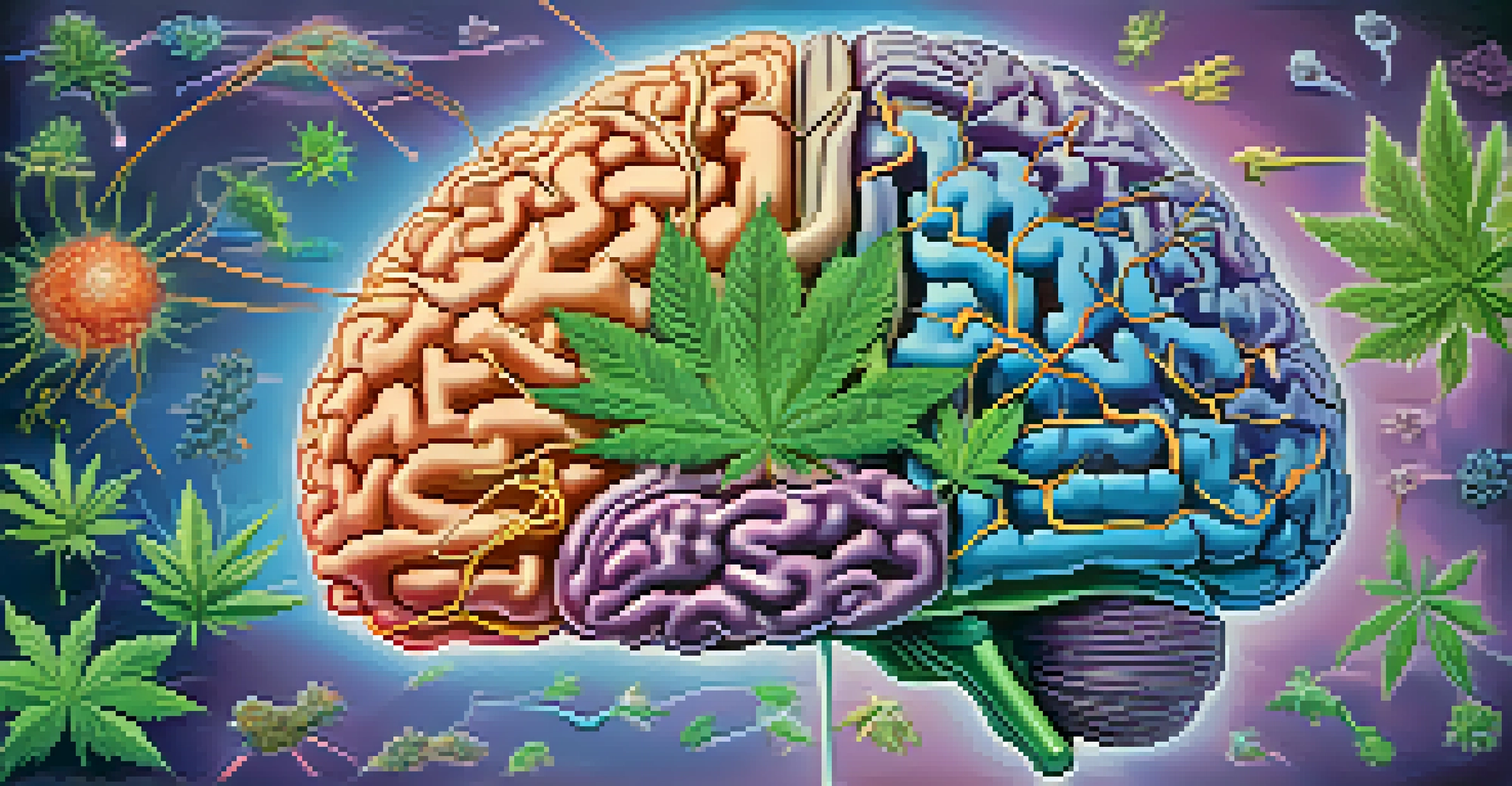The Science Behind Marijuana’s Impact on Epilepsy Management

What Is Epilepsy and Its Challenges?
Epilepsy is a neurological disorder characterized by recurrent seizures, which can significantly impact daily life. These seizures occur due to sudden, excessive electrical activity in the brain, leading to various physical and emotional challenges. Managing epilepsy often involves a combination of medication, lifestyle changes, and sometimes surgery, but not all patients respond well to traditional treatments.
The use of cannabis in treating epilepsy is gaining traction, and it's essential to explore its potential benefits and risks.
Many individuals with epilepsy experience side effects from conventional anti-seizure medications, prompting the search for alternative treatments. This is where marijuana enters the conversation, as its potential therapeutic effects are being increasingly explored. Understanding the science behind how marijuana interacts with the brain can provide insights into its possible benefits for epilepsy patients.
Related Resource
For those living with epilepsy, the quest for effective treatment options is critical. As the medical community investigates marijuana’s role, it opens doors for new approaches that could enhance the quality of life for many patients.
How Marijuana Interacts with the Brain
Marijuana contains compounds called cannabinoids, the most notable being THC (tetrahydrocannabinol) and CBD (cannabidiol). These compounds interact with the body's endocannabinoid system, a complex network of receptors and neurotransmitters that helps regulate various physiological processes, including mood, pain sensation, and, importantly, seizure activity. This interaction is key to understanding how marijuana may influence epilepsy management.

Studies suggest that CBD, in particular, has anti-seizure properties that may be beneficial for individuals with epilepsy. Unlike THC, CBD does not produce a 'high' and is believed to work by stabilizing electrical activity in the brain. This stabilization can potentially help reduce the frequency and severity of seizures in patients who do not respond well to traditional medications.
Epilepsy and Treatment Challenges
Epilepsy significantly impacts daily life, leading patients to seek effective treatment options beyond traditional medications.
The endocannabinoid system's role in regulating seizure thresholds highlights the importance of exploring marijuana as a therapeutic option. As research continues, it may provide new hope for epilepsy patients seeking effective treatment alternatives.
Research Findings on Marijuana and Epilepsy
Recent studies have begun to shed light on the effectiveness of marijuana in managing epilepsy, particularly focusing on CBD. One significant clinical trial found that CBD drastically reduced seizure frequency in patients with Dravet syndrome, a severe form of epilepsy. These promising results have led to increased interest and investment in further research to validate marijuana's potential as a treatment.
In a world where traditional treatments can fail, we must remain open to alternative therapies, including the use of cannabinoids.
Moreover, the FDA has approved a CBD-based drug, Epidiolex, specifically for treating certain types of epilepsy. This approval marks a significant milestone in acknowledging the therapeutic benefits of cannabinoids for seizure management. It also paves the way for more rigorous studies to explore additional applications of marijuana in the realm of epilepsy.
Related Resource
While the research is still evolving, these findings provide a foundation for understanding how marijuana can contribute to improved seizure control. As more evidence emerges, it may reshape the landscape of epilepsy treatment.
Potential Benefits of Marijuana for Epilepsy Patients
For many patients, the potential benefits of using marijuana for epilepsy go beyond just seizure control. Many users report improvements in mood, sleep quality, and overall well-being when incorporating CBD into their treatment regimen. These secondary benefits can significantly enhance their quality of life, making marijuana an appealing option for those struggling with traditional medications.
Additionally, marijuana may offer a more natural alternative to pharmaceutical drugs, which often come with a laundry list of side effects. Patients seeking holistic approaches may find comfort in using plant-based treatments that align with their health philosophies. However, it’s essential to approach marijuana use carefully and under medical supervision.
Marijuana's Role in Seizure Control
Cannabinoids, especially CBD, interact with the brain's endocannabinoid system, showing promise in reducing seizure frequency for epilepsy patients.
Overall, the potential for marijuana to provide a multifaceted approach to managing epilepsy symptoms is an exciting prospect. It encourages a more individualized treatment plan that considers both physical and emotional aspects of living with epilepsy.
Challenges and Considerations in Using Marijuana
Despite its potential benefits, using marijuana for epilepsy management is not without challenges. One major issue is the variability in marijuana products, which can differ significantly in cannabinoid concentrations and effects. This inconsistency makes it crucial for patients to work closely with healthcare providers to find the right dosage and formulation for their needs.
Moreover, while CBD is generally well-tolerated, it can interact with other medications, leading to unintended side effects. Patients must disclose all medications and supplements they are taking to their healthcare providers to avoid complications. This vigilance is essential for ensuring safe and effective treatment.
Related Resource
Understanding the legal landscape surrounding marijuana is also important, as regulations vary widely by region. Patients must navigate these laws to ensure they are using marijuana legally and safely. Awareness and education about these challenges can empower patients to make informed decisions about their treatment options.
Legal Status of Medical Marijuana for Epilepsy
The legal status of medical marijuana varies across different states and countries, which can complicate access for patients. In many places, CBD is legal and widely available, but THC-containing products may still be restricted or regulated. This patchwork of laws can create confusion for those seeking to use marijuana as a treatment for epilepsy.
Some states have established medical marijuana programs that allow patients with specific conditions, including epilepsy, to access cannabis products legally. These programs often require patients to obtain a recommendation from a licensed healthcare provider and may involve an application process. Understanding these regulations is crucial for patients who wish to explore marijuana as a treatment option.
Legal and Access Issues Persist
The legal status of medical marijuana varies widely, complicating access for epilepsy patients who may benefit from its use.
As public perception of marijuana continues to shift and more research emerges, it's possible that laws will evolve to better accommodate its use for medical purposes. Staying informed about the legal landscape is essential for patients to navigate their treatment journey successfully.
Looking Ahead: Future of Marijuana in Epilepsy Treatment
The future of marijuana in epilepsy treatment holds great promise as research continues to advance. Ongoing clinical trials and studies aim to uncover the full spectrum of benefits and potential risks associated with marijuana use for epilepsy. This growing body of evidence will be crucial in shaping guidelines and recommendations for healthcare providers and patients alike.
Moreover, as more states and countries legalize marijuana for medical use, access to these treatments will likely improve. This increased availability could lead to more patients exploring marijuana as part of their epilepsy management strategy. The conversation around medical marijuana is evolving, and it’s essential for patients to stay informed about new developments.

Ultimately, the integration of marijuana into epilepsy treatment could represent a significant shift in how we approach managing this complex condition. As we move forward, continued dialogue and research will be vital in ensuring that patients receive safe, effective, and personalized care.